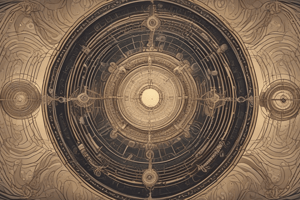Podcast
Questions and Answers
What happens to metabolic processes as body temperature decreases?
What happens to metabolic processes as body temperature decreases?
- They remain unchanged.
- They slow down. (correct)
- They speed up significantly.
- They become erratic.
How do biological clocks assist plants throughout the year?
How do biological clocks assist plants throughout the year?
- They measure rainfall levels.
- They regulate nutrient absorption.
- They determine root growth patterns.
- They track the time of day and year. (correct)
What determines when certain plants will flower?
What determines when certain plants will flower?
- The type of fertilizer used.
- The temperature of the soil.
- The amount of sunlight received each day. (correct)
- The water available in the ground.
What would be a consequence if a clock changed speed with temperature fluctuations?
What would be a consequence if a clock changed speed with temperature fluctuations?
During which seasons do some plants typically flower according to the length of daylight?
During which seasons do some plants typically flower according to the length of daylight?
How does temperature affect metabolic processes?
How does temperature affect metabolic processes?
What would happen to plants if they did not have a biological clock?
What would happen to plants if they did not have a biological clock?
What term is used to describe the 24-hour biological cycle in organisms?
What term is used to describe the 24-hour biological cycle in organisms?
What happens to the internal clock when a person is exposed to external cues like daylight?
What happens to the internal clock when a person is exposed to external cues like daylight?
What is the biological clock in mammals primarily found within?
What is the biological clock in mammals primarily found within?
What is a common experience when internal biological clocks become out of sync with the environment?
What is a common experience when internal biological clocks become out of sync with the environment?
What does the term 'diurnal' refer to?
What does the term 'diurnal' refer to?
What best describes the relationship between biological clocks and temperature?
What best describes the relationship between biological clocks and temperature?
Which of the following does NOT describe circadian rhythms?
Which of the following does NOT describe circadian rhythms?
What may cause an individual to require different amounts of sleep compared to others?
What may cause an individual to require different amounts of sleep compared to others?
Flashcards are hidden until you start studying
Study Notes
Internal Rhythms
- Your body operates on a 24-hour biological cycle called a circadian rhythm.
- This cycle governs many bodily functions, including body temperature, cell division, blood pressure, urine composition, metabolic rate, and medication responsiveness.
- Even in the absence of external cues, your circadian rhythm continues to operate.
- Circadian rhythms are present in both plants and animals.
- Diurnal organisms, like humans, are active during the day, while nocturnal organisms, like some mammals, are active at night.
External Cues
- External cues, such as changes in daylight, are essential for calibrating circadian rhythms to a precise 24-hour cycle.
- Individual circadian rhythms can vary slightly, which may explain differences in sleep needs.
- Disruptions to the circadian rhythm, such as jet lag, occur when internal clocks are out of sync with the environment.
Biological Clocks
- The biological clock in mammals is located in the hypothalamus, a region of the brain.
- Biological clocks are not affected by temperature changes, unlike other metabolic processes.
- Circadian rhythms also track the time of year, particularly important for plants that flower seasonally.
- Plants use the amount of sunlight they receive each day to determine the time of year and flowering time.
Studying That Suits You
Use AI to generate personalized quizzes and flashcards to suit your learning preferences.




